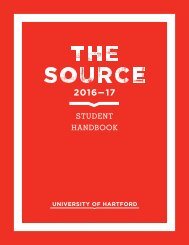advising
You also want an ePaper? Increase the reach of your titles
YUMPU automatically turns print PDFs into web optimized ePapers that Google loves.
UNIVERSITY STUDIES<br />
Advising Information: 860.768.5287<br />
Schools, Colleges, and Degree Programs<br />
University Studies<br />
Multimedia Web Design<br />
and Development (MWD 2 )<br />
The Multimedia Web Design and Development (MWD 2 ) program<br />
is an interdisciplinary undergraduate major leading to a Bachelor<br />
of Arts. Areas of study typically include web design principles,<br />
management information systems, problem solving and decision<br />
making, technical writing, and Internet programming. A series of<br />
project-based courses further develops students’ skills in multimedia,<br />
software development, computer networks, the Internet, and<br />
content-creation editing for various information formats, such as<br />
hypertext, sound, image, and typography.<br />
The degree is composed of three interrelated parts: general<br />
education, the major (core and specialization), and general electives.<br />
The general education requirements, while substantially similar to<br />
those required for a B.A. in the College of Arts and Sciences, have<br />
been specifically selected to support the MWD 2 major. The major<br />
has a core of 37 credits, including four 4-credit courses (MWD 110,<br />
MWD 210, MWD 310, and MWD 410) that are problem oriented<br />
and project based, using real-world multimedia and web-based<br />
problems and projects. Additionally, the major has a specialization<br />
requirement of a minimum of 15 credits that allows students to<br />
emphasize an area of information technology that meets their<br />
interests and career goals. These areas include, but are not limited<br />
to, advertising and marketing, media arts, network administration,<br />
network management, human-computer interaction, and multimedia<br />
production. Students with different career goals are encouraged to<br />
work with the MWD 2 faculty committee to create their own area<br />
of specialization. MWD 2 majors also have 18 credits of general<br />
electives that may be used to pursue a second specialization, minor,<br />
or other interest.<br />
MWD 2 First Year<br />
First Semester. Required courses: WRT 110 Academic Writing I (see<br />
page 24), DIA 100 Freshman Dialogue, and AUCT 150 Technology<br />
as a Human Affair. Recommended: PSY 105 Introductory Psychology<br />
and CMM 115 Improving Communication Skills.<br />
Second Semester. Required courses: WRT 111 Academic Writing II,<br />
CS 111 Programming Foundations, DES 221 Type 1 (Image<br />
Processing), and MWD 110 Foundations of Web Design and<br />
Development.<br />
Recommended: CMM 110 Introduction to Communication.<br />
Course Descriptions<br />
AUCT 150 Technology as a Human Affair [4]<br />
This course provides an introduction to the interactive relationship<br />
between technology and society. Students study technological<br />
advancement as social change, not simply to monitor the<br />
transformations of our society but also to understand why they<br />
occur and what their consequences are. (Critical Thinking and Oral<br />
and Written Communication) Laboratory fee.<br />
CS 111 Programming Foundations [3]<br />
An introductory computer programming course designed for<br />
students with no prior programming background. Emphasis is<br />
placed on problem solving and the translation of solutions into a<br />
programming language. Topics include data types, input/output,<br />
control structures, loop structures, and program modularity.<br />
This course may be used to prepare the student with no prior<br />
programming experience for CS 114 or as a one-semester exposure<br />
to programming. Prerequisites: (1) Two years of high school algebra<br />
with an average grade of at least B and (2) a high school computer<br />
course or CS 110. Not open to students who have completed a<br />
higher-level CS course. Laboratory fee.<br />
DES 221 Type 1 [3]<br />
An introductory course in visual communication design that focuses<br />
on learning the fundamentals of typography, typographic syntax, and<br />
semantics. The course aims to increase awareness of how typography<br />
is designed and used, and of how it should be appreciated in<br />
reference to historical and current cultural influences. Studio<br />
procedures incorporate handwork as well as computer-generated<br />
explorations. Course work includes studio exercises, projects, reading,<br />
writing, and research. Prerequisite: FWS 110.<br />
MWD 110 Foundations of Web Design and Development [4]<br />
Project-based, hands-on course focuses on developing front-end<br />
architectures for websites. Students follow a systematic, user-centered<br />
model to develop small-/medium-size websites. Particular emphasis<br />
is on using appropriate standards-based technologies to separate and<br />
implement content, structure, presentations, and behavior of web<br />
elements. Students get an introduction to HTML markup, CSS<br />
styling (Cascading Style Sheets), and scripting. Laboratory fee.<br />
13



